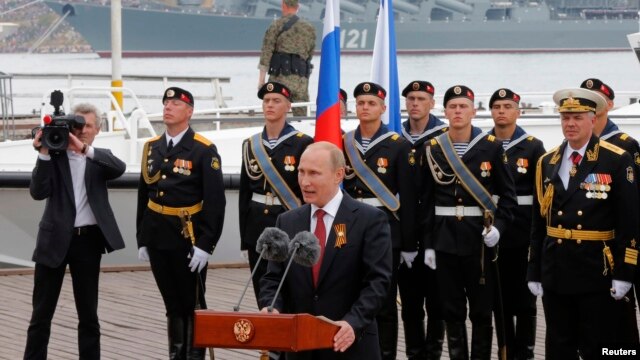
Russian President Vladimir Putin makes a speech during events marking Victory Day, in Sevastopol, Crimea, May 9, 2014.
Russian President Vladimir Putin flew to Crimea Friday to mark the Soviet Union's World War II victory, his first trip to the peninsula since Moscow annexed it from Ukraine in March.
Putin declared his country is now stronger with the annexation of Crimea.
"I am sure that 2014 will go into the annals of our whole country as the year when the nations living here firmly decided to be together with Russia, affirming fidelity to the historical truth and the memory of our ancestors,'' Putin was quoted as saying during a speech in the port city of Sevastopol.
"There is a lot of work ahead but we will overcome all difficulties because we are together, which means we have become stronger," the Russian leader said during his remarks to military leaders and other officials.
The Kyiv government immediately condemned Putin's visit as a violation of Ukraine's sovereignty and international law. The March 21st annexation of Crimea is not recognized by the United States, the European Union and NATO.
The Obama administration criticized the trip as provocative and repeated its rejection of the region's annexation. The European Union also weighed in, saying the commemoration of victory in World War II shoud not be used to showcase Russia's annexation of the region.
Putin arrived was treated like a hero upon his arrival in Sevastopol, where Russia's Black Sea Fleet is based. Earlier in the day, he watched as thousands of Russian troops marched through Moscow to mark Victory Day, the 69th anniversary of the end of World War II.
Putin made no mention of the situation in Ukraine during public remarks in Moscow. Both the Sevatopol and Russian anniversaries fall on May 9.
Later in the day, Russian Foreign Minister Sergey Lavrov in a telephone conversation with U.S. Secretary of State John Kerry called for urgent dialogue, mediated by the Organization for Security and Cooperation in Europe, between Kiev and south-eastern regions of Ukraine.
Lavrov also called for Washington to help end Ukrainian military operations in the south-east of the country.
Mariupol clash
Meanwhile, Ukraine's interior minister said security forces had killed about 20 pro-Russian rebels in the port city of Mariupol on Friday.
Interior Minister Arsen Avakov said an attempt by "terrorists'' to seize police headquarters turned into a pitched battle inside the building with Ukrainian army, national guard and security forces.
The Ukrainian forces brought armoured personnel carriers into the town and the building caught fire at one point. The rebels then fled into the town.
Mariupol, situated in the "People's Republic'' declared by ocal pro-Russian rebels, has been the focus of days of skirmishing between Ukrainian police and separatist gunmen. The area is due to hold a referendum on secession on Sunday that Kyiv has declared illegal.
The Associated Press reported that one of its journalists had see three bodies near Mariupol's police station, including that of a policeman.
But pro-Russian separatists in Donetsk and Luhansk said they will go ahead with Sunday's balloting, despite the Russian leader's call for a delay on Thursday.
Russian media quoted separatist Denis Pushilin, leader of the self-declared Donetsk People's Republic, as saying the referendum will ask residents to vote yes or no on whether they support a "proclamation of state independence."
Luhansk residents will be asked the same question, despite recent polling showing 70 percent of residents in eastern Ukraine want to remain part of Ukraine.
Fuel
In another development, Russia ordered energy-dependent Ukraine to pay in advance for all future natural gas deliveries.
The Russian Energy Ministry said Thursday Ukraine missed a Wednesday deadline to pay down a $3.5 billion energy debt. As the cash-poor Kyiv government struggles to maintain economic and political stability, Moscow now says all gas sent from June 1 will require cash in advance.
It remained unclear late Thursday what impact the prepayment edict will have on the European Union. Russia supplies about 30 percent of Western Europe's gas needs, with about half of those supplies passing through Ukraine.
Ukraine has so far refused to pay down its energy debt to protest Moscow's recent gas price increase that nearly doubles what Ukraine's energy monopoly Naftogaz pays its neighbor.
The Russian president last month warned the European Union that it would require gas prepayments from Ukraine, unless Europe helped cover the Ukraine debt. Since then, the International Monetary Fund has approved a loan package to Kyiv that includes an initial payment of more than $2 billion.
|
|
